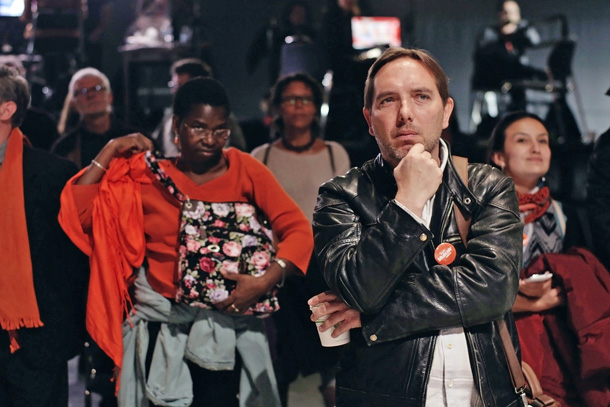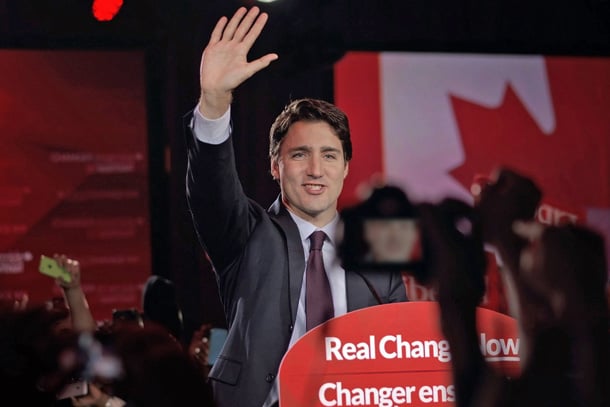NDP MLA George Heyman, one of the few New Democrats with enough spirit to show up early at the shell-shocked party's gloomy get-together election night in Vancouver, spoke without hesitation when asked: What happened? How did his NDP go from leading in the polls in early September to being dispatched back to its third-party cubby-hole?
"People were waiting to see who the agent of change would be. I think many elements of the NDP campaign were very good. But we were unable to project to Canadians that we would be bold and adventurous. And Justin Trudeau saw a gap and he leapt into it."
A red wave of Anything-But-Conservative strategic voting terminated Stephen Harper's decade-long rule, resurrected a Liberal Party many thought was in near-terminal decline, and dealt a terrible blow to the New Democratic Party, which believed it had finally become a real player on the national scene.
The strategic voting advocates got what they wanted -- an end to the vote-splitting that allowed Harper to control government with only the support of one-third of the electorate.
But for social democratic progressives like Heyman, the end of Conservative rule came with a huge cost: a greatly reduced NDP caucus, and the loss of any political leverage to force the new majority Liberal government to alter its past practice of governing from the right after campaigning from the left.
"Two-thirds of Canadians have certainly had their fill of Stephen Harper," said Heyman. "And in this first-past-the-post system, people decided that they had better coalesce around one alternative -- that is what happened tonight."
David Moscrop, a political scientist at the University of British Columbia, similarly said the election was about which party could defeat Harper, which became a problem for the NDP. "Soon as you start to slip, you slip fast because people start abandoning. That is the tricky thing about strategic voting -- it's fickle. And as soon as the NDP support started to decline, the Liberals became the obvious choice."
'Some change, some day'
There were three key elements behind the accelerating shift of anti-Conservative voters to the Trudeau Liberals and away from the NDP in the long campaign's final three or four weeks, pundits say.
Trudeau's decision to embrace short-term deficits to fund needed infrastructure gave him a fresh, activist swagger that set him apart from the NDP, which stuck to a more centrist, balanced-budget approach to soften its spendthrift reputation.
The niqab debate in mid-September hurt the NDP in its essential Quebec fortress, sending a message to anti-Conservatives in the rest of Canada that the party would not have enough seats to form government.
Finally, Trudeau more than exceeded expectations -- and more than matched Mulcair in debate and on the stump. His youthful, almost Kennedyesque looks embodied the change factor in TV ads and news coverage far more than the NDP's Mulcair who, as HBO comedian John Oliver cruelly put it, "is not what change looks like.... Change visually does not look like (bearded actor) Paul Giamatti's uncle."
The Liberals, on the other hand, captured the desire for change when they announced their plan to run deficits, said Greg Lyle, an expert on elections and public opinion, who heads the Innovative Research Group.
"The Liberals became 'real change now' and the NDP was 'some change, some day,'" said Lyle. "And that's not going to rally the troops."
The federal Liberals effectively shifted to the left of the NDP, just as the provincial Ontario Liberals under Premier Kathleen Wynne did in the previous election. And it worked, said Lyle, because "while most people don't feel they are left or right, they want something done now."
Lyle said the NDP campaign opted for caution and waited for Trudeau to make some damaging gaffe. "They were cutting into the Liberal base and had the potential to drive more Liberals over. But they missed it by playing it safe."
The Trudeau stumble never happened and the NDP failed to change course. "The NDP made some reasonable assumptions. But once they saw that this was the Ontario election happening all over again, they should have changed.
"But then that would have given the Tories a target. So they sort of froze and at the last minute, the NDP went against the TPP (Trans-Pacific Partnership) as a way to change their position. And it was just too little, too late."
Occupying the left flank
Thomas Homer-Dixon, an international affairs professor at the University of Waterloo, said that Trudeau's deficit policy "caught the zeitgeist because Canadians are sick of austerity. They may not be thinking in Keynesian terms, but there is a sense that Trudeau's policy is activist. People aren't worried about balancing the budget because that's been done."
The problem for the NDP, said Homer-Dixon, was its perceived need to reassure skittish centrist voters. "Mulcair had to say: 'You will be safe with me.' But he left his left flank wide open and Justin went in there and occupied it."
UBC's Moscrop said that the federal NDP ran a timid campaign, not unlike the ill-fated 2013 BC NDP campaign under Adrian Dix. "But the NDP was in a bad spot, they didn't know what it would be like for them if they came out for deficits. And it's almost a Greek tragedy in the sense that if the NDP had called for deficits, as the Liberals did, they would have been tarred and feathered for it. They can't get away with it the way the Liberals can."
Last spring, Moscrop wrote a column in the National Post called "Why do we need a Liberal party?" In an argument that couldn't have been more wrong, Moscrop predicted the demise of the Liberals. "With the NDP and the Conservatives topping recent polls and the Liberal party under Justin Trudeau going from tiger to paper tiger, the party is in decline.... The Liberals look to be finally getting squeezed out of the middle."

But in this election, said Moscrop on Monday, the Liberals ended up benefiting, "much to my surprise," from being in the centre. People considering the NDP switched to the Liberals. Voters considering the Conservatives switched to the Liberals. "Somehow, the Liberal party has this surprisingly consistent ability to hold the middle and collect votes from the left and right. It continues to baffle me."
(Moscrop wasn't the only academic or commentator who wrote-off the Liberals. Peter C. Newman, once one of Canada's best-known political journalists, wrote a whole book after the 2011 election about the Liberals' inevitable slide into irrelevancy.)
For the University of Waterloo's Homer-Dixon, the niqab issue promoted by the Conservatives was another critical factor behind the collapse of the NDP and rise of the Liberals. The niqab debate softened NDP support in Quebec, a province where the Mulcair campaign had to once again win big in order to have any chance at victory.
In Homer-Dixon's view, there were two to three million "Anybody-But-Harper" voters across Canada waiting for a signal about which party to rally around. And by hurting the NDP in Quebec with the niqab controversy, the Conservatives ended up giving the Liberals a huge boost.
"Once the NDP's numbers in Quebec went down, they were no longer a viable contender for governing party and the only alternative were the Liberals," said Homer-Dixon. "It's really striking if you look at the daily Nanos polling figures. The decline in the NDP and the rise of the Liberals' polling numbers are almost a mirror image of each other from mid-September on."
The Conservatives' decision to raise the niqab issue and stoke anti-Muslim sentiment was "too clever by half," said Homer-Dixon. "The Conservatives may not have realized how effective it would work, because they had to know that they needed to keep the NDP and the Liberals as balanced as possible across the country. But they ended tipping that balance."
Election analyst Lyle said the NDP didn't lose supporters in Quebec during the two weeks of the niqab debate -- but that the issue galvanized many undecided francophones on the identity issue and sent them to the Bloc Québécois. And, as the percentage of decided voters grew, the NDP's percentage of the decided pie dropped, creating the illusion that they were losing supporters.
The Liberals at that time weren't harmed by the niqab because their support in Quebec early on in the campaign was based primarily on federalists comfortable with the civil liberties position taken by Trudeau, said Lyle.
But, in the end, the Liberals attracted former NDP voters in Quebec with their message of "positive change and jobs for the middle class," he said.
Chrétien's secret sauce
Polling numbers weren't the only factor anti-Harper voters were considering -- leadership was another.
On that question, Mulcair started the campaign far ahead of Trudeau, who was burdened with an image as a callow, inexperienced, not-terribly-bright young man whose main attribute was his last name. But, by the end, Trudeau's impressive campaign performance and advertising efforts had more than overcome his poor start.
"I got the sense that nobody really connected to Thomas Mulcair at a sort of visceral or personal level. And they did with Justin Trudeau," said UBC's Moscrop. "Now, that is not fully determinative. But in a close race where people are looking for whatever they can find for a cue, personality can matter a great deal.
"The Conservatives set up this he's-not-ready narrative, but when Trudeau showed up, it looked like he was ready. It had an amplifying effect because he not only met expectations, he exceeded them."
Homer-Dixon, who has met with Trudeau, said the new prime minister is a clever political operator. "He also has an asset that Jean Chrétien had -- and that is that he is consistently underestimated."
Veteran political watcher Lyle said that Trudeau delivered a "phenomenal performance, especially for someone who was supposed to be not up to the job. The Liberals, Lyle said, were able to take their leader's alleged weakness, his youth, and turn it into an advantage: "Someone who was fresh and new." ![]()
Read more: Federal Politics, Election 2015
















Tyee Commenting Guidelines
Comments that violate guidelines risk being deleted, and violations may result in a temporary or permanent user ban. Maintain the spirit of good conversation to stay in the discussion.
*Please note The Tyee is not a forum for spreading misinformation about COVID-19, denying its existence or minimizing its risk to public health.
Do:
Do not: